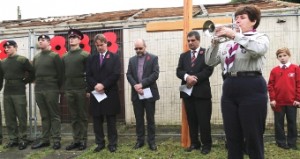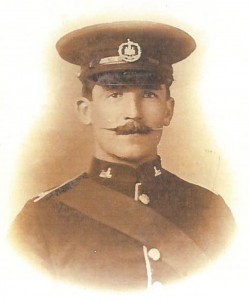Like many communities across the UK and elsewhere, Knaphill gathered to remember last Tuesday, 11th November at 11am. Led by Rev’d Richard Sherlock, a short service of Remembrance was held outside the old library site on the High Street, with contributions from Knaphill Junior School, St Hugh of Lincoln Catholic Primary School, The Royal British Legion, The British Army, Jonathon Lord, MP, Cllrs Debbie Harlow and Saj Hussain, and representatives of Knaphill Methodist Church and Holy Trinity Church, Knaphill. You can read the work of the schools by clicking on the thumbnails below, and the full liturgy is available by clicking here.
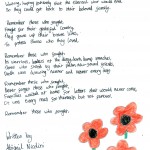 |
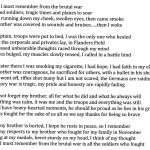 |
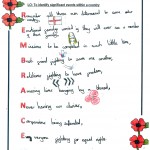 |
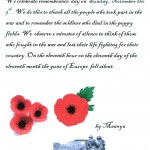 |
At 11pm on the evening of the 4th August 1914, Germany failed to respond to the British ultimatum. Diplomacy collapsed, mobilisation across Europe was ordered and by the end of the month the guns were roaring and crashing around the soldiers of the tiny British Expeditionary Force as it stood against the might of the German Army’s main attack into Belgium.
The first British soldier killed in that war is buried in a cemetery just outside Mons, only yards from where the last British soldier was killed and buried over four years later on 11th November 1918. In between those events, according to official statistics, 888,246 British and Commonwealth soldiers lost their lives. Millions more from other nations suffered the same fate.
Such huge events, and such massive loss of life, seem overwhelming to comprehend. That is why I believe the installation at the tower of London is so powerful. Yes it comprises 888,246 individual ceramic poppies, each representing a life killed, but also a see of red – for it is apply entitled “Blood swept lands and seas of red”. It can, if we let it, us to grasp the horror, the loss, the individual pain and sacrifice of just one conflict that has befallen humanity over the past century. For sadly, it turned out not to be the Great War to end wars but instead the precursor to the World War that followed just twenty one years later and laid the foundations for the unstable world in which we now live. For just how big would the field of remembrance need to be to reflect in the same way every life lost in war over the last 100 years?
Nations, armies and communities are are made up of individual people – like you and me – each one created in the image of God. Each one treasured and mourned by God. So we need to see such loss of life not so much as an anonymous collective tragedy, but, as in the case of the British army in the first world war, as 888,246 personal tragedies. Each life lost was someone’s son, daughter, brother, sister, husband, wife and friend; one of our relatives. And for me, one of those was my great grandfather, Company Serjeant Major William Joseph Parker, of the British Army, Dorsetshire Regiment, who was killed in action at Givenchy-les-la-Bassee, France on 13/10/1914 aged 34.
Wars might be started by powers and principalities for a variety of motives but they are fought by individual men and women – each one precious, not only to their families, but to our creator, God himself.
Let us now hear one such voice from a WW1 trench, north west of Arras, France; the cry of a Lieutenant Ewart Mackintosh and be courageous enough to weep with him as he records the loss of his men in action on the evening of 16th May 1916.
So you were David’s father,
And he was your only son,
And the new-cut peats are rotting
And the work is left undone,
Because of an old man weeping,
Just an old man in pain,
For David, his son David,
That will not come again.
Oh, the letters he wrote you,
And I can see them still,
Not a word of the fighting,
But just the sheep on the hill
And how you should get the crops in
Ere the year get stormier,
And the Bosches have got his body,
And I was his officer.
You were only David’s father,
But I had fifty sons
When we went up in the evening
Under the arch of the guns,
And we came back at twilight –
O God! I heard them call
To me for help and pity
That could not help at all.
Oh, never will I forget you,
My men that trusted me,
More my sons than your fathers’,
For they could only see
The little helpless babies
And the young men in their pride.
They could not see you dying,
And hold you while you died.
Happy and young and gallant,
They saw their first-born go,
But not the strong limbs broken
And the beautiful men brought low,
The piteous writhing bodies,
They screamed “Don’t leave me, sir”,
For they were only your fathers
But I was your officer.
[In Memoriam – by Lt Ewart Alan Macintosh, who was also killed in action on the 21st November 1917, aged 24]

